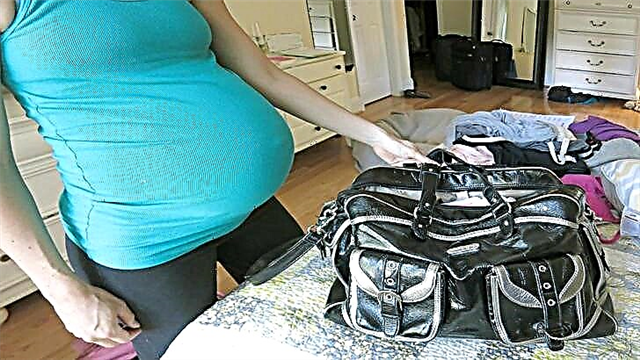Poor appetite in a newborn and baby is a serious cause for parental anxiety. Many mothers are worried because it is extremely difficult to figure out why a child does not eat well. Both newborn babies and babies at 4 months cannot explain and tell what specifically does not suit them. They demonstrate all their displeasure with the help of screams and tears, or simply tacit refusal and unwillingness to suckle or drink the mixture. This also complicates the ability to establish the cause of poor appetite, since experts identify many negative factors due to which a small child can start to be capricious, cry and refuse to eat.
Why does a baby eat poorly?
That a newborn baby, that a child at 5 months old can eat poorly for many reasons, among which are the peculiarities of lactation in the mother, health disorders, physiological characteristics at birth and much, much more.
Milk problems
If the baby is not breastfeeding well, it can be assumed that there is a “problem” in lactation. For example, some nursing mothers have an excess of milk secretion, while others, on the contrary, are sorely lacking.
 In the first case, the child simply chokes because of the too powerful "jet" of milk, as a result of which he can abandon the breast. In such a situation, the mother needs to express a little before feeding. And then, when the children's appetite increases (for example, at 2 weeks), the need for this procedure will disappear.
In the first case, the child simply chokes because of the too powerful "jet" of milk, as a result of which he can abandon the breast. In such a situation, the mother needs to express a little before feeding. And then, when the children's appetite increases (for example, at 2 weeks), the need for this procedure will disappear.
The opposite situation is when the child does not have enough milk. In this case, the mother needs to take all measures permitted and approved by the pediatrician that improve lactation:
- more frequent latching of the baby to the breast;
- pumping after breastfeeding;
- drinking a lot of fluids;
- drinking a special tea that improves milk separation.
If all these measures did not lead to a qualitative improvement in lactation, the only way remains is to supplement the baby with formula. But before introducing an artificial product into a children's diet, you need to consult a pediatrician.
Sometimes women are not entirely responsible about their own diet, using those foods that change breast milk. For example, spicy vegetables (onions, garlic) change the taste of breast secretions, causing the baby to refuse to breastfeed. The way out is quite simple - to approach the menu with all responsibility.
Features of the feeding process
It is not uncommon for a child to eat little because of incorrect attachment to the breast. This happens especially often with inexperienced parents who are raising their first child.
The solution is quite simple - a woman should seek help from an expert on breastfeeding, or even in a maternity hospital, ask employees to clearly demonstrate how to properly attach the baby to the mother's breast.

A newborn baby sometimes does not take mother's breast due to the irregular shape of the nipples. If they are too flat, sunken, it is not easy for the baby to get milk.
Naturally, the child remains hungry, which is completely unacceptable. Usually after a day or two, babies adjust and adapt, but in rare cases, if the situation does not improve, the pediatrician may advise the use of special nipple pads.
Congenital features
Often, babies are born earlier than planned. As a result, the innate sucking reflex is not formed to the extent that would allow the baby to suckle without problems. That is, a premature baby does not refuse to eat, but simply is not able to get milk, because he does not have enough strength.
Naturally, in such a situation, the mother must correct the problem. Feeding with a bottle (it is easier to suck), a syringe or a teaspoon will help her in this. It should only be understood that the habit of eating from a special container is fraught with a complete rejection of the mother's breast.
In addition, impaired appetite can be caused by other congenital characteristics. Usually, such anomalies are found in the maternity hospital, where they are immediately corrected, but this is not always possible.
- Anomalies in the structure of the oral cavity. Congenital defects of the oral cavity, which are popularly called "cleft lip" or "cleft palate", can also cause the child to eat poorly and gain little weight. Usually, the operation is performed immediately (if children's health allows), but if the procedure is postponed to a later date, special feeding pads may be required.
- Short lingual frenulum. If a baby is born with a short film connecting the bottom of the mouth with the root of the tongue, it will be uncomfortable for him to suck milk. When sucking, you can even hear a characteristic clatter. Usually the problem is solved easily - the surgeon cuts the bridle, and the newborn baby (and a child under 5 months old) does not feel pain at all.
If childbirth took place with the use of anesthesia, then some of the painkillers can enter the child's body. As a result, in the first days, newborns are lethargic, which also affects insufficient activity during feeding.
Teething
A decrease in appetite or a complete lack of it in an infant at 5 months old may be due to the first teeth coming out. In such a situation, refusal to eat becomes a completely natural and temporary phenomenon.
 The baby's appetite not only decreases, but the gums begin to swell, the temperature rises. The child also feels pain, so it is imperative to help him. So, in case of temperature, you can give an anti-inflammatory and antipyretic agent.
The baby's appetite not only decreases, but the gums begin to swell, the temperature rises. The child also feels pain, so it is imperative to help him. So, in case of temperature, you can give an anti-inflammatory and antipyretic agent.
In order for the baby to start eating with appetite as soon as possible, it is necessary to smear his gums with special gels with cooling, soothing and analgesic properties several times a day. It is also recommended to purchase special teethers massaging the gums at the pharmacy.
Tummy pain
If a one-month-old baby does not take the breast well, constantly throws it, tries to pull his legs to his stomach and cries loudly, it can be assumed that he is worried about intestinal colic. In this case, parents should be patient and know how to alleviate this condition.
Experts advise putting a warm diaper on the baby's stomach, massaging the navel area, and giving special anti-colic drugs. This will improve the functioning of the still imperfect digestive system, and at about 4 months the unpleasant symptoms will go away on their own.
It also happens that the child begins to suck milk, but then refuses the breast with tears. Probably, poor appetite in infants and a painful condition are caused by dysbiosis caused by the intake of antibacterial drugs by the mother.
Only a doctor can confirm the presence of this condition after a special examination. Parents, on the other hand, may suspect dysbiosis for signs such as an unpleasant odor of feces, a green color of feces and the presence of mucus.
Other diseases
A child at 3 months or at 11 months can refuse breast milk due to malaise. A common problem for babies in the first year of life is thrush. It is easily recognized by white spots on the baby's tongue, gums and palate.
Oral candidiasis occurs in infants the following reasons:
 infection from the mother during the passage through the birth canal (typical for newborns);
infection from the mother during the passage through the birth canal (typical for newborns);- taking antibiotics by a baby (for older children);
- weak children's immunity;
- using dirty pacifiers or feeding bottles;
- poor breast hygiene.
If a newborn eats little due to thrush, it is better to seek help from a doctor who will tell you what drugs or folk remedies can be used in a particular case. The easiest way is to treat the oral cavity with soda or saline solution.
With the same remedy, mom needs to treat her breasts to prevent relapse. In addition, you need to take care in the future about the cleanliness of toys and feeding devices, as well as strengthen children's immunity, especially if the baby was born prematurely.
If a baby, say, does not eat well at 11 months, breathes heavily during feeding, sniffs, throws breasts and cries, mucous accumulations interfere with normal breathing. To alleviate the condition, you need to very carefully clean out the nasal passages with cotton swabs or flagella.
Another reason why a newborn does not eat well is inflammation and pain in the ears. The child would like to eat, but sucking leads to unpleasant sensations, so he can refuse to breast. In this case, you need to contact a pediatric doctor for treatment.
If a child is 2 months or older does not want to eat due to sore ears, the mother can try to express breast milk and give it to the baby with a teaspoon. This way of getting food for the baby is less painful than breastfeeding.
Using the bottle
If your baby is not eating enough breast milk, you need to think about how often you use feeding containers and pacifiers. It was noted that babies suck formula from a bottle and mother's breast in completely different ways, using different amounts of muscles.
This happens because the liquid flows freely from the container, so that the child does not make efforts to extract it. But breast milk must be obtained. If this is the problem, then the mother needs to re-teach the baby to breastfeed.
Meteosensitivity
Another reason why babies eat poorly may be their sensitivity to changes in weather conditions. A sharp jump in atmospheric pressure can provoke a headache, loss of appetite and other negative symptoms in a baby.

If these signs are overly pronounced, you should consult a pediatrician and neurologist. The source of the problem is likely to be high intracranial pressure. Then you will need to take certain medications.
Curiosity
A newborn baby is usually only interested in feeding and sleeping, but he reacts weakly to external stimuli. Another thing is a child of 6 months, who is more active, curious and willing to learn about the world around him.
While eating, the baby can be distracted by any irritant: loud noise, bright or new toy, a pet, or a person entering. It is not easy to switch children's attention to feeding, which is why you should create the most relaxed atmosphere before meals.
In addition, poor appetite in a tiny newborn may be due to a bad mood. If the crying baby is not approached immediately after the first tears, he begins to cry even more. Therefore, when brought to the breast, he simply cannot capture the nipple due to overexcitation.
In this case, the primary task is to calm down the baby by any available means. You can stroke him, kiss him, offer a pacifier, shake him a little, and only then offer the breast again. Usually, a calmed infant quickly begins a meal.
There are often cases when a child does not eat a lot due to individual characteristics. Such babies are also called "little ones". If the doctor notes that the baby is active and cheerful, develops according to age norms, why bother?
Above were presented the main reasons why a child does not eat well. If the mother carefully monitors children's reactions, she will be able to understand the baby's condition and normalize his appetite. But in case of unpleasant symptoms, you should definitely consult a doctor.
Why does the child eat formula poorly?
This question has been placed in a separate section, although some aspects concerning the nutrition of artificial people coincide with the problems of breastfed children. And yet, artificial babies have their own reasons for not eating.
 The main problem is choosing the right mixture. It is not very easy to find a breast milk substitute that would suit the child's taste and at the same time do not harm children's digestion. So, for newborns, a mixture is adapted, specially developed for the smallest.
The main problem is choosing the right mixture. It is not very easy to find a breast milk substitute that would suit the child's taste and at the same time do not harm children's digestion. So, for newborns, a mixture is adapted, specially developed for the smallest.
The fifth month of life is already a completely different age period, therefore, nutrition must also change. After all, the baby has grown, which means that his needs for calorie food have also grown. In addition, at this time, the first complementary food for artificial people is usually introduced.
In addition to the incorrectly selected mixture, there are other reasons why a child at 3 months old does not eat well:
- uncomfortable nipple. Even small children already have their own preferences. Some people like thicker latex tips, while others prefer silicone nipples. Parents should purchase several devices at once so that the child can choose the best one;
- a sharp transition to a milk substitute. If the baby is used to eating exclusively with mother's milk, switching to artificial nutrition can lead to negativity or temporary rejection of the formula. In this case, gradual accustoming to a different diet is important;
- the nutritional value of the mixture. Milk replacer is more nutritious and will be absorbed by the body longer. Therefore, an artificial child will feel hunger not after 2.5 hours, but, roughly speaking, after 4 hours. This aspect should also be taken into account so as not to overfeed the baby.
Therefore, when feeding a baby with a milk replacer, it is important to choose the right formula, silicone or latex bottle caps, and to optimize the feeding regimen. In this case, children's appetite should soon return to normal.
Weight gain
A child is born with an instinctive-reflexive type of behavior. That is, all his actions are subject to certain instincts, which include the sucking reflex. The kid still does not know how to overeat, so normally he eats as much as necessary. If the mother thinks that the child is eating poorly, you need to check whether he is gaining weight.
Experts have developed special tables, which specify how many grams a child should add every 7 days, every 30 days and every 12 months. Reconciliation with the standards allows parents to understand how well the nutrition is organized, whether there is enough milk for the baby or needs to be fed.
After birth, the baby's body weight decreases within 7 days. However, you should not worry, since this is a completely natural process. Meconium (newborn feces) leaves the child's body, and the child is in a stressful state. After a week, the weight will start to increase.
Consider the average weight gain over the first 12 months:
 up to 3 months - the average gain is 800 grams per month, since the child is constantly sleeping and does not expend a lot of energy;
up to 3 months - the average gain is 800 grams per month, since the child is constantly sleeping and does not expend a lot of energy;- from 4 months to six months - the child begins to understand the world, turns over, sits down (at 5 months). Increase at 4 months and older - 500 - 800 grams;
- from six months to 9 months - the child actively crawls, sits down, gets up in bed, receives complementary foods. Weight gain is 300 - 600 grams per month;
- from 9 to 12 months - the baby explores the world around him, spending almost all the calories. On average, body weight gain is 100 - 500 grams per month.
Less weight gain does not mean that the child is having any problems. Such indicators are very conditional, since everything depends on the characteristics of the infant himself.
As already noted, poor appetite does not always mean soreness or pathology. In any case, an experienced doctor can dispel all concerns.
Correcting the situation
The child does not eat well, what should I do? Many mothers turn to specialists with this question. We have already talked about some ways of solving the problem, it's time to talk about more specific and particular cases.
Feeding frequency
The question of why a baby is constantly breastfeeding is not entirely correct when it comes to a newborn baby. Very young children eat very often - at least every 2 to 2.5 hours. This feature must be "used".
If the baby does not want to eat right now, then, perhaps, at the next feeding he will want to try milk or mixture. The number of meals should be temporarily increased in order to catch the moment when the child's appetite will be optimal.
Duration of food intake
If before you calculated the time during which the baby was near the breast, now this practice should be abandoned. Try to increase the duration of feedings, have the baby suckle at the rate that is typical for him today.
First offer one breast to the baby and apply to the other only after emptying. Back milk is especially nutritious - it is fatter and more nutritious. With a sharp change in breast, the baby will not receive the required amount of calories, using only liquid front milk.
Night feedings
If the child does not want to eat during the day, or at this time his appetite is not very good, try applying it to the breast at night. Put the baby in your bed so that you and the baby come to the time of feeding in the most relaxed state.
Curiously, the hormone prolactin, which is responsible for milk production, is more actively secreted at night, so that such feedings can be considered more productive. Perhaps the child will eat more food at night.

Refusal from wrapping
If the newborn is not eating, try not wrapping him up when feeding. On the contrary, skin-to-skin contact with the mother's skin will enable him to activate. This method is especially suitable for sleepy and "inhibited" babies.
Does the baby passively behave near the chest? Take off his undershirts (you can just cover the back with a blanket), throw off the upper part of your clothes and thereby create close bodily interaction.
Sling application
As you know, the appetite grows at the sight or smell of your favorite dish. It is the same with newborn babies. If they are constantly near the mother's breast, they will want to eat more often.
Try carrying your baby in a so-called sling - a cloth bandage that will allow you to take your baby with you almost everywhere and at the same time free your hands. In addition, the constant movement of the mother will not allow the baby to fall asleep during feeding.
Mom's rest
Another useful tip, which, unfortunately, is not always easy to implement, relates to maternal rest. However, this recommendation does indeed improve the quality of lactation. Therefore, try to rest more yourself.
Try to devote more time to yourself: increase the duration of walks, try to sleep during the day, take every opportunity to get some rest. Of course, for this you need to enlist the support of family and friends.
The advantages of such an attitude are obvious: if the mother gets a good sleep and rests, then the amount of stress hormones that slow down the release of milk will decrease. As a result, lactation is improved and some feeding problems disappear.
A few words in conclusion
Thus, a reduced appetite in an infant can be due to a number of physiological or psychological reasons.
Mom can cope with some problems on her own, in other situations she cannot do without the qualified help of a doctor. The situation is easy to fix if you closely monitor the baby and react to every change in his reactions.

 infection from the mother during the passage through the birth canal (typical for newborns);
infection from the mother during the passage through the birth canal (typical for newborns); up to 3 months - the average gain is 800 grams per month, since the child is constantly sleeping and does not expend a lot of energy;
up to 3 months - the average gain is 800 grams per month, since the child is constantly sleeping and does not expend a lot of energy;

